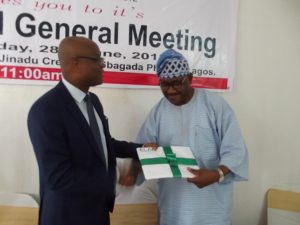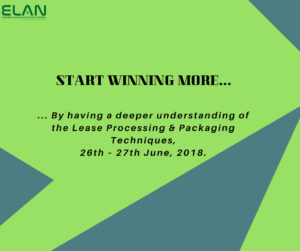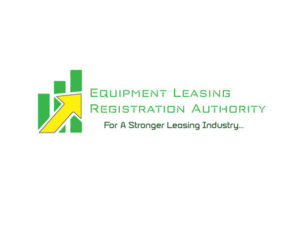Blog
ELAN ELECTS NEW BOARD OF DIRECTORS
The Equipment Leasing Association of Nigeria (ELAN) recently held its 23rd Annual General Meeting (AGM) in Lagos. Major highlights of the meeting include the presentation of the 2017 Annual report and accounts, providing an overview of the key activities and initiatives conducted by the Association in 2017 and the election of a new Board of Directors. The new Board is chaired by Olutoyin Okeowo, Managing Director/CEO Metropolitan Motors Limited. Other members of the Board include Elizabeth Ehigiamusoe (Mrs),…
ELAN VISITS MEMOSE INTERNATIONAL LIMITED
The Equipment Leasing Association of Nigeria (ELAN) recently paid a courtesy visit to Memose International Limited. The visit is part of the Association’s strategic focus to foster closer relationship with members and other stakeholders to enhance the value proposition of the Association to the leasing industry and Nigerian economy. The ELAN delegation was received by Mr Emeka Ariguzo, Managing Director/CEO . The delegation led by Bode Dinyo, Director of ELAN / Chairman Membership Committee, briefed the host on…
ELAN VISITS INDUSTRIAL AND GENERAL INSURANCE PLC
The Equipment Leasing Association of Nigeria (ELAN) recently paid a courtesy visit to Industrial and General Insurance Plc (IGI).The visit is part of the Association’s strategic focus to foster closer relationship with members and other stakeholders to enhance the value proposition of the Association to the leasing industry and Nigerian economy. The ELAN delegation was received by Mr Bayo Folayan, Managing Director/CEO and other Executive Management team. The delegation led by Bode Dinyo, Director of ELAN / Chairman…
Start winning more!
The success of a leasing business depends on the understanding of key factors such as: effective business packaging strategies; winning the deals strategies, customised pricing and structuring techniques as well as standard documentation. This programme is designed to achieve these and many more to make you a Champion in these essential areas of your business This unique programme offers participants the following: Identify the baits to overcome in documentation Understand the strategies for winning the lease Gain adequate…
ELAN HOLDS 23RD ANNUAL GENERAL MEETING
The 23rd Annual General Meeting (AGM) of the Equipment Leasing Association of Nigeria (ELAN) shall be held on Thursday, 28th June 2018 at ELAN Training Centre, 25B, Fola Jinadu Crescent. Gbagada Phase 1, Lagos. During the meeting, members are expected: To receive the Audited Financial Statements for the year ended 31st December 2017 together with the Reports of the Directors and Auditors To re-appoint Auditors and authorise the Directors to fix their remuneration To elect Directors
A NEW DAWN FOR THE LEASING INDUSTRY IN NIGERIA
The Equipment Leasing Act 2015 is part of Government’s support frame work to further stimulate development of the leasing industry to contribute more effectively to the national economic development. The Act is intended to create sanity, certainty into the practice of leasing, identifying and protecting the relationship and rights of stakeholders, enhancing confidence and encouraging more investments. A key aspect of the law is the establishment of the Equipment Leasing Registration Authority (a public-private-partnership arrangement), to among other…
THE NIGERIAN LEASING INDUSTRY MAINTAINS POSITIVE OUTLOOK
The Nigerian leasing industry continued its positive growth trend in 2017. Outstanding lease volume during the period stood at N1.44trillion as against N1.26trillionin 2016, representing a growth of 14.5%. This growth was facilitated by the relative stability in the macroeconomic environment, increasing demand, new entrants into the leasing industry and increased value of assets due to the depreciation of the Naira. THE NIGERIAN LEASING INDUSTRY MAINTAINS POSITIVE OUTLOOK, GREW BY14.5% IN 2017
10 KEY STEPS TO DEVELOP END OF LEASE NEGOTIATION STRATEGY
Several activities may be performed by the lessor at the end of lease. These include negotiation with the lessee and the first thing to do is to look at the lease agreement to ascertain the end of lease rights and obligations. The agreement may for instance provides for renewal, purchase or return of the leased asset you should look for a win –win situation Start the negotiation by asking for more than you actually want. This creates flexibility and…
WINNING THE LEASE
These involve several ingredients including: ¨ Identifying the type of lessee: Are they those that need to lease (motivated only by cash consideration e.g. MSMEs or those that want to lease (motivated by other factors apart from cash e.g. large corporate organisations. The approach to the two types of lessee will be different ¨ Knowledge of the lessee’s needs (who, what ,when ,where, and how) ¨ How can products be developed to meet these wants and needs? ¨ Understand the benefits of leasing…











